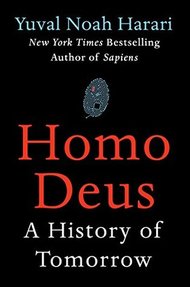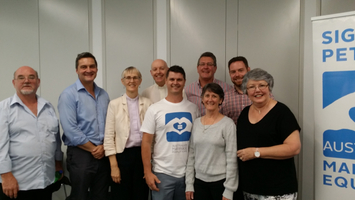 Looking into the future is notoriously difficult, as any historian knows. The most we can really do is to be as honest and perspicacious as we can about our past and present and extrapolate as best we can with tempered imagination. Yuval Noah Harari (professor of history at the Hebrew Museum in Jerusalem) does a good job of this in his recent book Homo Deus: A History of Tomorrow. It is certainly a challenging vista he opens up. Due to the speed and scale of unprecedented change, he argues that homo sapiens as we know ourselves will not exist in a hundred years. This is due to major technological shifts, particularly in biotechnology and artificial intelligence, which threaten to make religion and various forms of humanism redundant. For we appear to be at the beginning of a 'data-religion' age, in which the algorithms and a small number of their elite human 'managers' (in corporations like Google and Facebook) become increasingly dominant. Harari is not unappreciative of the past positive, as well as negative, evolutionary contribution of both religion and humanism. Religion, for example in its Christian form, was a powerful force historically in enabling human development through doctrines such as the 'imago dei' in every being, and in its earlier contributions to enabling technology, society and art. Yet its constructive role is essentially at an end, hastened by its inability to keep up, never mind engage, with today's scientific and technological drivers. Humanism, in whatever form, also appears to be very long in the tooth as an ideological bearer of the future. For example, modern democracy - a central humanist fruit - cannot operate as efficiently or inteiligently as a contemporary algorithm in working out preferences, policies and directions. Intelligence increasingly appears to be separable from consciousness, another religious and humanist core principle. In a world where death (for some) can be further postponed, what then also happens to meaning? Harari's work asks powerful questions of us. Like his previous dazzling bestseller Sapiens, Homo Deus is a product of great scholarship, crossing many disciplines, and written in lively, vivid language. Its author is no lightweight thinker. Indeed he claims to meditate for two hours a day and goes on extended retreats, whilst, being gay, he says, helps him to question received opinions. “Nothing should be taken for granted,” he has said, “even if everybody believes it.” (see further The Guardian 19 May 2017) It is thus both contemplative as well as intellectually attentive. No doubt, like other 'end of history' books, some of his contentions may be misplaced or over-exaggerated, as well as misused by others. Yet we would do well to reflect upon it, if we are at all serious about building on the fruitful aspects of humanism, in its religious or secular forms. What kind of spirituality and politics do we need in our changing bio-technological and data-intelligent world?
0 Comments
 'When someone starts talking about principles, watch your back!' This was one of many 'bon mots' I learned from Geoff Garner, my delightful supervising vicar when I was a curate in the East End of London. Partly what he was saying was that when human beings become agitated, for or against a controversial proposal, humanity and genuine love go out the window. So called 'principles' and 'values' become used as weapons: at best providing insulation from genuine engagement, or, often, simply being used to harm others. Geoff himself knew well to his cost how this worked. As a founding member of LGCM (originally the Gay Christian Movement), as an inter-faith adviser to the Bishop of London, and in the open and humane way he ministered with others, he was frequently a target of others' internal difficulties and defensiveness. For Geoff, and for me, this is far from how Jesus lived, taught and acted. Last weekend I spoke at the Toowoomba Marriage Equality event, sharing my own, positive, perspectives on what is too often an area of Christian 'principled' resistance and denial (click here for my address on that occasion). At the meeting, I was once more struck by the qualities of love, joy, and kindness so many LGBTI+ people have for one another and others. Since then, I have once more been overwhelmed by the generosity and warmth of fellow marriage equality supporters with whom I have corresponded. This, I believe, reflects the immense wellspring of love within the LGBTI+ community which still longs for full release. It is a powerful contrast with the spirit of some Christian circles which persist in turning their backs on this wonderful source of renewal for us all. Most certainly, there is also Christian discomfort about marriage equality which is neither bigoted nor defensively armed with principles. One of my close Anglican colleagues for example is wary of marriage equality legislation because they feel some advocates are themselves equipped with principles (such as exaggerated 'rights' discourses) which they can wield like aggressive weapons. Perhaps, but I saw none of this last weekend in the keynote addresses of Marriage Equality leaders such as Shelley Argent and Rodney Croome. Instead they spoke with humour and humility about those things which touch all our lives: love and family, pain and joy, being valued, recognition and relationships. These are not abstract principles but the realities of life which bind us together. One Christian leader who has upbraided me since last weekend accuses me, among other things, of being infected by humanism. It is one accusation - unlike many others - which, with qualifications, I am happy to own. For a healthy Christian humanism is surely an antidote to picking up the weapons of principle. Like my mentor Geoff Garner, I see in Jesus the embodiment of the humane as well as the the holy, someone who stood not on principle but in the power of love: in that sense being both fully human as well as fully revealing of the mystery of divine love which transcends all our human differences (male and female, Jew and Gentile, and all the rest - including queer and straight). Julia Baird, in a recent article, reflects, in a typically incisive and balanced manner, on the challenges of discerning what is 'free' speech and what is 'hate' speech in the marriage equality debate. My sense is that part of the answer is in returning with prayerful discernment to the Christian injunction about 'speaking the truth in love' (Ephesians 4.15). Too often this can mean Christian justification for simply being mean, aggressive, demeaning, or worse. When I hear or read the words 'I just want to say this to you in Christian love', I am also instinctively tempted to duck for cover, just like Geoff Garner. It is hardly that I do not care about truth and truth-speaking. Part of my problem is that parts of the Church do not really want to explore truth and sometimes actively seek to silence the truths of others. No, the heart of the matter is what we mean by love. Is it truly an openness to genuine truth-seeking and the fresh insights of the Holy Spirit, or is it only a cover for ego and group fear and defensiveness? Whatever our views on marriage equality - and, sadly, the debate is likely to go on in the Church as a whole for ages after it is settled in Australia in law - when we come to 'speaking the truth in love', perhaps we need to spend more time on that last word love. It is too easy to leap to principle without love. For those of us who share in pastoral care, the ability to share a prophetic word is also important. Yet we need to be kind and compassionate in how, as well as what we say. For me, much maligned 'political correctness' often seems really to amount to no more than being polite and respectful to others - precisely the opposite of the Pharisaism, wielding principles like weapons, which Jesus so abhorred and transcended. We are not all agreed, not will we be, with or without a plebiscite. Most Christians however, for and against, genuinely seek to honour God and our conscience. So let us seek the truth indeed, but let us be gentle with it. |
AuthorJo Inkpin is an Anglican priest serving as Minister of Pitt St Uniting Church in Sydney, a trans woman, theologian & justice activist. These are some of my reflections on life, spirit, and the search for peace, justice & sustainable creation. Archives
July 2024
Categories
All
|
 RSS Feed
RSS Feed